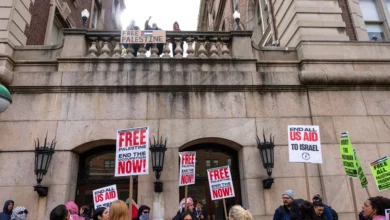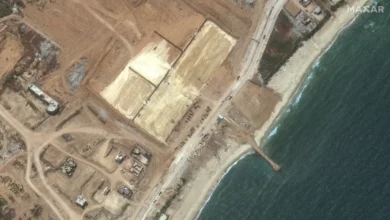With governments and political entities across the Arab world beginning to reconsider their alliances in light of the tumultuous political situation in the region, Hamas, the political party that controls the Gaza Strip and resistance movement against Israel, is no exception.
The Syrian government has long hosted the Hamas' political bureau, including its head, Khaled Meshaal. But with the Syrian uprising showing no signs of abating, Hamas has found itself in a predicament, loath to condemn the protests for fear of alienating its support base in Gaza, but also also reticent in supporting the protests so as not to risk the ire of its Syrian benefactor.
Another factor, according to international relations expert Emad Gad from Al-Ahram Center for Political and Strategic Studies, is that the Muslim Brotherhood in Syria is among the leaders of the protests against the majority Shia regime of Syrian President Bashar al-Assad.
Hamas, an offshoot of the Muslim Brotherhood, refused when asked by Assad to condemn the protests, says Gad. Also in refusing to condemn the protests, Hamas risks angering another of its benefactors, Iran, which remains supportive of the Syrian government.
However, Hamas did disperse an anti-Syrian protest in mid-August within the Gaza Strip – under its control since the split with rivals Fatah in 2007 – mindful that outright support of the protests would go too far in angering its powerful patron states.
The pan-Arab daily newspaper Al-Hayat was the first to report in April that Hamas was contemplating leaving Damascus, having supposedly been ordered to leave by the Syrian regime for its neutral stance on the uprising. The alternative options mentioned in Al-Hayat were Egypt, Jordan and Qatar. However, a Hamas spokesman refuted this report, saying it had not been asked to leave Damascus and what was happening in Syria was an internal matter that did not concern Hamas.
Hamas Foreign Minister Mahmoud al-Zahar, who serves in the Gaza-based government, said on 9 September that all Palestinians in Syria were in “distress,” including Hamas members, and that Egypt was one of the options available to the group in case of relocation, as reported by the Jerusalem Post. However Zahar also stated that Hamas had not officially requested Egypt to relocate.
On 10 September another Hamas political bureau member, Moussa Abu Marzouk, stated that Hamas had no intention of leaving Syria, according to the Jerusalem Post, which also cited Egypt’s envoy to the Palestinians Yasser Osman as saying that the possibility was not even being discussed in Cairo. Osman added that Egypt was satisfied with the Palestinian Liberation Organization representation in Cairo.
As the protests continue in Syria, the pressure on Hamas to take a stand one way or the other is increasing and the current unrest has placed the group in a delicate position. However, the alternatives for relocation of the politburo do not seem to be more viable.
This is all the more pronounced in light of the recent troop movements on the Egypt-Israel border by the Egyptian military and attempts to seal many of the smuggling tunnels that permeate the Egypt-Gaza border. The border has been a hotspot since the August attacks on Eilat that reportedly originated from the Egyptian border.
American University in Cairo political science professor Walid Kazziha says, “For Hamas to leave Syria this will put it in the hands of Egypt or Jordan. We can discount Jordan on the basis of its strong relations with the West and its peace treaty with Israel.”
“The question also arises about the suitability of Egypt for Hamas; the situation in Cairo will not reassure them because there are powers in Egypt who view Hamas as a threat to its national security,” he adds, “especially with the recent attempts to block off the tunnels.”
Egypt, through both its foreign ministry and its intelligence services, regularly hosts Hamas leaders for two main reasons. It is attempting to arbitrate a reconciliation agreement between Hamas and Fatah and is also acting as the arbiter between Hamas and Israel in negotiations for the release of captured Israeli soldier Gilad Shalit. Shalit has been held by Hamas since 2006.
Al-Hayat had also reported that Qatar seemed amenable to hosting Hamas in Doha after both Egypt and Jordan had refused overtures to accept the presence of the political bureau. However, Qatar also had preconditions about hosting the faction, apparently willing to host the political leadership of the group surrounding Meshaal but unwilling to host Hamas' military leadership.
Hence, according to the newspaper, the possibility was discussed of Meshaal going to Doha and his deputy, Moussa Abu Marzouk, relocating to Cairo. However, Kazziha discounts Qatar as an option for simple geographical reasons, the island nation being thousands of kilometers away from Gaza.
Gad, though, feels that Qatar, a wealthy nation that is seeking to play a greater role in the region, is a viable option for the group.
"Egypt is moving troops to the border to close the tunnels,” he says, and would not be willing to accommodate the group given the "current circumstances."




